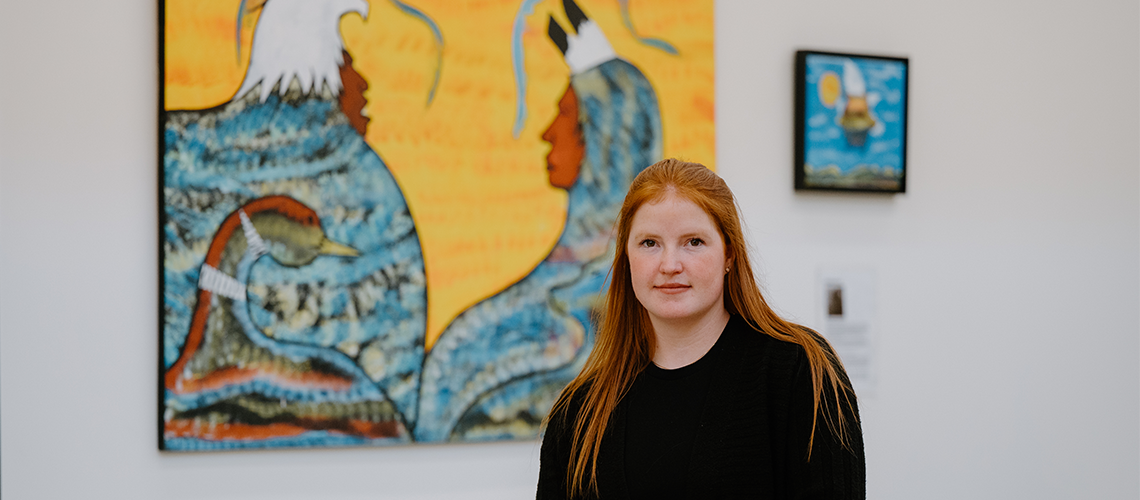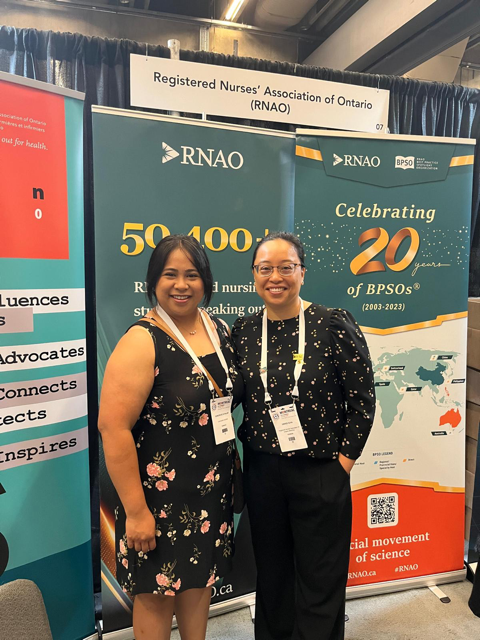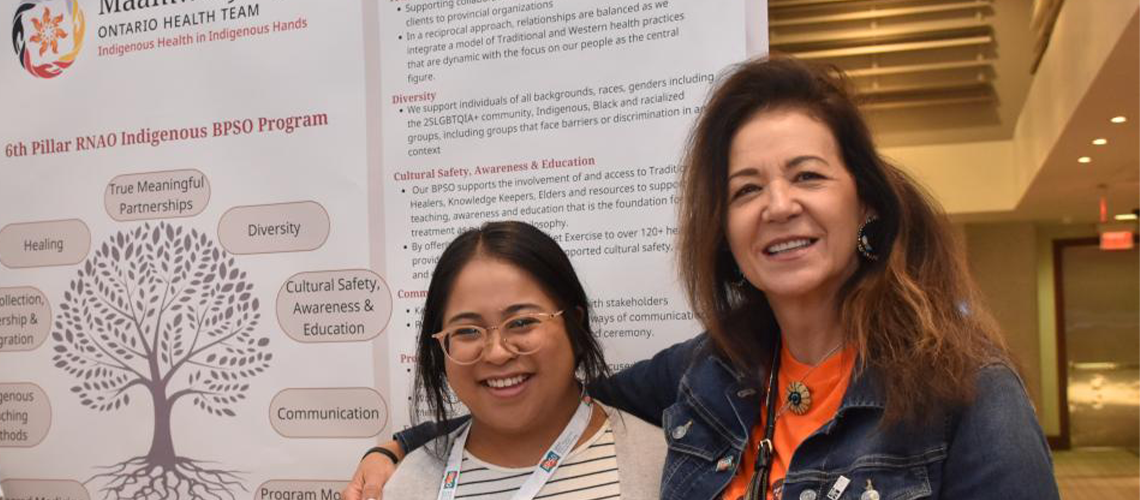
As an Indigenous social worker and the Best Practice Spotlight Organization® (BPSO®) lead for Chigamik Community Health Centre, Cassandra Forget has worked closely with her nursing colleagues since 2019 to implement RNAO’s Assessment and Interventions for Perinatal Depression best practice guideline (BPG). She is grateful for the knowledge she has gained as a champion of evidence-informed care within this BPSO, which is located on the shores of Georgian Bay. What makes Forget and others at Chigamik unique is their focus on ensuring an Indigenous world view is weaved with BPG recommendations. Their work is part of RNAO’s Indigenous-focused BPSO program.
Forget says she takes a wholistic approach to each recommendation to ensure the different populations that access services at Chigamik are receiving culturally sensitive care and feel respected. For Indigenous populations, she asks clients if they want to conduct a smudge or have any traditional medicines available during treatment. She also offers the option to have additional conversations with elders and traditional healers throughout their care.
“If they mention they are high risk for postpartum depression, we offer a (custom) care package…it could be seeing an Indigenous perinatal mental health worker or counsellor…(or) joining a peer-led support group,” says Forget. The key is offering different approaches to care, knowing that a single approach doesn’t work for everyone, she explains. “It’s really just asking each individual client what kind of culture they practice…and what approach they’d like to take.”
RN Genevieve Catalan is also part of RNAO’s Indigenous-focused BPSO program as a non-Indigenous ally. She says the experience has been liberating. And it’s something she takes great pride in.
Joining the program was an opportunity to be “…leaders for weaving western health care and Indigenous cultures together to really help our clients,” says the pre- and post-natal RN and BPSO lead for Anishnawbe Mushkiki, an Aboriginal Health Access Centre in Thunder Bay. Anishnawbe Mushkiki was one of the first organizations to join the program in 2019, and Catalan and her colleagues have worked hard to implement several BPGs with an Indigenous lens.
Using RNAO’s Person- and Family-Centred Care BPG as a starting point, Catalan, with the guidance of a traditional wellness navigator, took her time building a better understanding of Indigenous cultures so she could incorporate this knowledge into her work, particularly through meaningful engagement and trust-building. Now, when clients walk into the health centre, they’re greeted by Indigenous artwork, they’re offered tobacco ties (a piece of cloth to tie one’s tobacco in a small bundle) and they’re welcomed in a more open setting where they can share their stories.
“We’ve really tried to do those little things…so they can see all their cultures reflected in the place they’re visiting and create that feeling that this must be a safe place for me to come,” says Catalan. It's a goal that is shared by all of the Indigenous organizations in the program (see sidebar for the full list), and one that RNAO has been striving for since the inception of the program.
In 2018, following the success of RNAO’s Tobacco and Nicotine Intervention Initiative, the association applied for and received new funding to join forces with key Indigenous partners, elders and communities. The goal was to expand the BPSO program to address the emotional, physical, social and economic inequalities that Indigenous communities continue to face.
It was at this point the new Indigenous Health program began to come to life, founded on developing and sustaining meaningful partnerships with Indigenous organizations that support tailored practice changes that are responsive to the community needs.
“At the heart of the program is meaningful partnership, co-creation and collaboration,” says Sabrina Merali, who was the program manager at the time. In March 2019, RNAO announced the first eight organizations that had signed on to participate.
“There was a need to develop resources and tools from an Indigenous lens that would enable BPG implementation,” says Grace Suva, who has been the program manager since 2021. This included working directly with the Indigenous-focused BPSOs to develop ways to provide evidence-informed care in a culturally sensitive and safe way.
Catalan adopted the two-eyed seeing approach in her work, which weaves together Indigenous culture and western health-care approaches, as both can learn from and complement one another. This involves listening, seeking guidance from elders, creating a comfortable space for people to share their stories, and using a trauma-informed approach to care. “With elders or with any Indigenous persons…it’s always important to listen to what they’re saying, think about what they’re saying and ask questions after,” says Catalan.
“At the heart of the program is meaningful partnership, co-creation and collaboration.”
Instead of going through a list of questions in her assessments, she takes her time and waits for her clients to open up when they’re ready. “I don’t always bring up all the questions that I want to bring up to a client right away…I like to build on that relationship,” she explains.
Maxine Lesage, BPSO lead for Maamwesying Ontario Health Team (OHT) – the first Indigenous BPSO OHT to join the program in 2022 – has created a unique approach for her organization’s BPG implementation. Lesage, who is Indigenous, created a sixth pillar in the BPSO program that outlines the importance of clear communication, trust, Indigenous languages, beliefs and traditions to deliver culturally safe practices.
These Indigenous BPSOs are engaged in the program
Six of the original eight* program partners graduated in 2023:
- Anishnawbe Mushkiki Aboriginal Health Access Centre
- Chigamik Community Health Centre
- Mamaway Wiidokdaadwin Indigenous Interprofessional Primary Care Team
- Ontario Native Women’s Association
- Sandy Lake First Nation
- Seventh Generation Midwives Toronto
These newest partners will graduate when they meet all the deliverables for designation:
- Maamwesying North Shore Community Health Services (OHT)
- Shibogama First Nations Council
*Two of the original eight partner organizations have withdrawn from the program.
This includes: supporting individuals of all backgrounds; supporting collaborative partnerships at all system levels; and encouraging the involvement of and access to traditional healers, knowledge keepers, elders and resources to support cultural teaching, awareness and education.
Lesage, who also represents Region 11 on RNAO’s board of directors, has a lot of hope that becoming an Indigenous-focused BPSO will make a real difference. “It speaks volumes about reconciliation. It speaks volumes about us working together, moving forward, never forgetting the past,” she says. “It’s going to make a huge difference for our communities and most importantly our people to have better health outcomes and a better quality of life.”
RNAO CEO Dr. Doris Grinspun, who secured the funding for the program, agrees wholeheartedly with Lesage. She recently paid a visit to Pikangikum First Nation (near Kenora), to speak with elders and nurses. “We learn from Indigenous peoples – including Indigenous-focused BPSOs – much more than what we give. We learn from their pride, wisdom and resilience,” Grinspun says.
Since the program’s launch in 2019, RNAO has released its first-ever Indigenous-focused BPG: Promoting Smoking Reduction and Cessation with Indigenous Peoples of Reproductive Age and Their Communities. Program partners have also begun re-envisioning the champions program from an Indigenous worldview, through the creation of a core team led by Lesage.
“I think this is a game changer…it will really help translate the Leading Change Toolkit (a resource to implement BPGs) in a way that will resonate with current and future Indigenous-focused BPSOs and future champions,” says Suva, who looks forward to working with Indigenous communities to further develop the program.
Chigamik, Anishnawbe Mushkiki and four other program partners achieved their designation as full-fledged BPSOs (in 2023) and are now looking ahead to implementing additional BPGs and continuing with the improvements they’ve already made.
“Each year, we will be taking on a new BPG,” says Forget, adding that the program has given Chigamik staff more time for collaboration. “I think it’s a really great thing and it allows (us to) …come together and really just ensure that we’re providing the best possible care.”
Catalan also expects the program will grow and expand across different settings within Indigenous communities. It “…shows that you don’t necessarily have to be an Indigenous-focused organization to weave Indigenous cultures…into what your organization does already,” she says. What this program shows is that it is “a way of recognizing what has happened in the past and rebuilding relationships and trust.”
Through this, we can make positive changes and work towards truth and reconciliation.
Find out more about Indigenous health and RNAO by visiting the In Focus section online.


